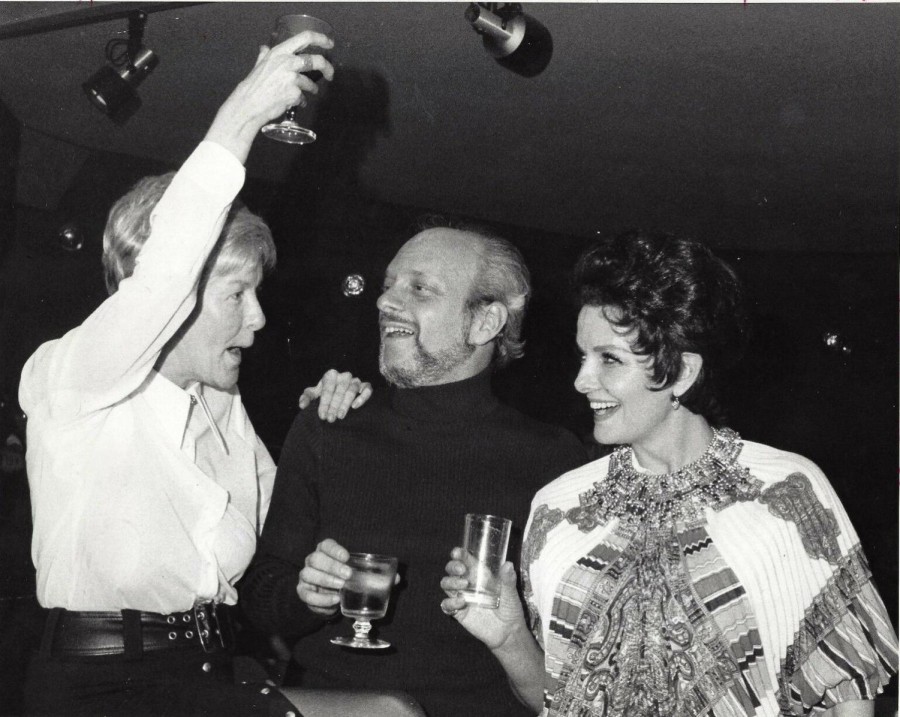Review: A gender-bent ‘Company’ revival just misses the emotional mark
This classic Sondheim concept musical gets a fresh 2022 makeover.
The original 1970 Stephen Sondheim musical comedy “Company” was nominated for 14 Tony Awards. (Image via Wikimedia Commons)
April 6, 2022
The revival of Stephen Sondheim and George Furth’s 1970 musical comedy “Company” opened its doors at the Bernard B. Jacobs Theater on Dec. 9, 2021. After its March 22, 2020 premiere was canceled by COVID-19, “Company” has proven itself to be one of the best musicals this season. The original show is about the single, attractive and recently-turned-35 Bobby who is constantly harassed by his array of married friends to settle down. The revival, directed by Marianne Elliott and starring Katrina Lenk and Patti LuPone, features a big change, with the principal role of Bobby becoming Bobbie, a woman.
Although it seems like it could upend the whole show, it works swimmingly. Making Bobbie a woman keeps the 52-year-old show fresh after numerous runs on Broadway and the West End. But that isn’t the only change — others include the addition of smartphones and a diversified cast which make the iconic Sondheim tunes fit a more 2022 worldview. These changes make songs like “Another Hundred People” less about the beauty of New York City and more about living in the moment and ditching dating apps. The classic “Ladies Who Lunch” also becomes more of an eye-opening attack on Bobbie than a self-loathing number when sung to another woman.
But in the end, it wasn’t the powerhouse solos that brought down the house, but the group numbers. The way the modest cast of 14 united their voices to produce a beam of sound was truly enthralling. Special recognition must be given to Matt Doyle, who plays Jamie, for pulling off what is arguably one of Sondheim’s most challenging songs, “(Not) Getting Married Today,” with ease. Credit must also be given to Bobby Conte, who plays P.J., for carrying a demanding stage presence and energy into songs like “Another Hundred People,” which makes you want to take his hand and run through the streets of the city.
LuPone is extraordinary as the cynical Joanne — a role she’s mastered at this point, having played it at both the Kennedy Center and the West End. You can’t help but lose yourself in her performance as she makes you laugh, cry, love her and even hate her a little. She takes in every moment like she’s eating a three-course specially-tailored meal, basking in every perfect note. When she recedes back into her seat after crushing the number “Ladies Who Lunch,” she gives a quick smirk as if to say “Yes, I am that good.”
Then, at the center of it all, there is Lenk of “The Band’s Visit,” who plays Bobbie. Lenk’s voice and acting chops do not fail in their charm, making you want to know exactly what she’s thinking behind her childlike grin. But Lenk is perhaps most telling in her interactions with other members of the cast. Here, she left something to be desired. Although “Company” is a musical comedy, the show still possesses a very raw emotional core. In moments where the audience is supposed to see this sincerity of the piece, Lenk blurs the line between comedy and drama with a gag or a funny face.
For example, in the number “What Would We Do Without You,” when Bobbie dances alone after watching all her friends do choreographed moves with their spouses, Lenk does a goofy spasm just to get a laugh from the crowd, but it blinds the intention of this moment, which is to point out Bobbie’s loneliness. This lack of deep emotion makes big numbers like “Marry Me a Little” not feel as earned as they should be by the character and frankly, a bit boring.
Lenk’s soprano voice in a role originally written for a tenor also hindered the performance, especially in the show’s final number, “Being Alive.” The powerful sustained final note intended to represent Bobbie’s journey is not as impactful when given to Lenk, making the last song feel not as poignant as it should be.
But what makes up for the minor infraction on Lenk’s part is the amazing direction by Elliott. If any word describes her mindset for “Company,” it’s physical. At one point, Bobbie crawls through a tiny door into a diorama of her own apartment. In Elliot’s take on the sequence “Tick-Tock,” the choreography is able to articulate a lifetime in minutes, as actors performing different scenes weave around each other across the stage. Bunny Christie’s impressive set design is also quite a feast for the eyes. The number 35 lives on the set somewhere in every scene, constantly reminding us that Bobbie’s clock is ticking.
This revival of “Company” retains the lighthearted fun of the show while featuring updated commentary on modern-day dating. Whereas most Broadway shows are forms of escape for the audience — a place to forget all your problems — “Company” seems to shove introspection to the forefront, making the audience reflect in the dark with 1,000 strangers. See this revival if you can — especially if you’re a young person living in New York. As Bobbie notes, in New York, you meet “a man a minute,” but that doesn’t necessarily make the dating process easy.
“Company” is playing at the Bernard B. Jacobs Theater at 242 W. 45th St. It runs for two hours and 45 minutes with one intermission.
Contact Luke J. Curnin at [email protected].
























































































































































